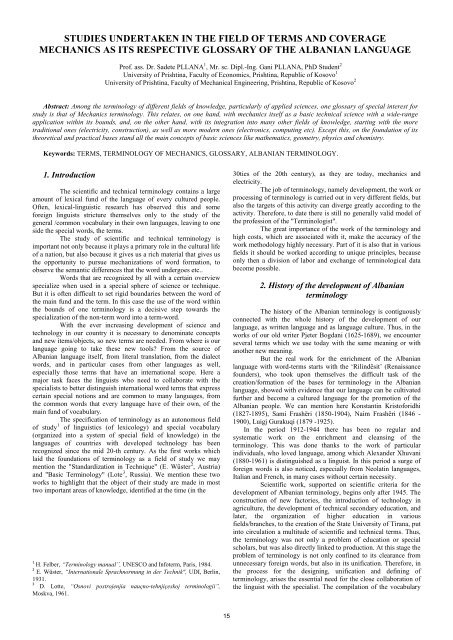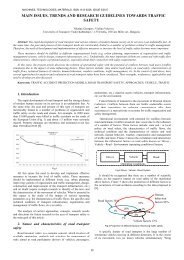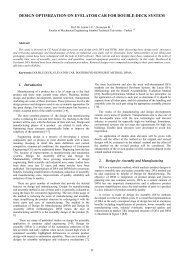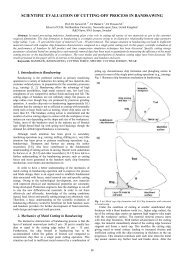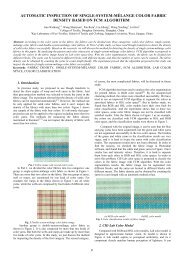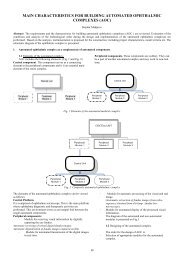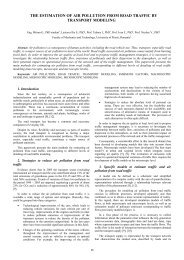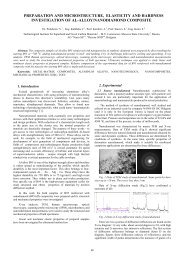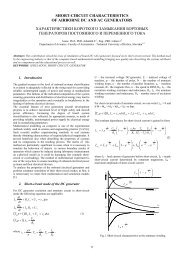studies undertaken in the field of terms and coverage mechanics as ...
studies undertaken in the field of terms and coverage mechanics as ...
studies undertaken in the field of terms and coverage mechanics as ...
You also want an ePaper? Increase the reach of your titles
YUMPU automatically turns print PDFs into web optimized ePapers that Google loves.
STUDIES UNDERTAKEN IN THE FIELD OF TERMS AND COVERAGE<br />
MECHANICS AS ITS RESPECTIVE GLOSSARY OF THE ALBANIAN LANGUAGE<br />
Pr<strong>of</strong>. <strong>as</strong>s. Dr. Sadete PLLANA 1 , Mr. sc. Dipl.-Ing. Gani PLLANA, PhD Student 2<br />
University <strong>of</strong> Prisht<strong>in</strong>a, Faculty <strong>of</strong> Economics, Prisht<strong>in</strong>a, Republic <strong>of</strong> Kosovo 1<br />
University <strong>of</strong> Prisht<strong>in</strong>a, Faculty <strong>of</strong> Mechanical Eng<strong>in</strong>eer<strong>in</strong>g, Prisht<strong>in</strong>a, Republic <strong>of</strong> Kosovo 2<br />
Abstract: Among <strong>the</strong> term<strong>in</strong>ology <strong>of</strong> different <strong>field</strong>s <strong>of</strong> knowledge, particularly <strong>of</strong> applied sciences, one glossary <strong>of</strong> special <strong>in</strong>terest for<br />
study is that <strong>of</strong> Mechanics term<strong>in</strong>ology. This relates, on one h<strong>and</strong>, with <strong>mechanics</strong> itself <strong>as</strong> a b<strong>as</strong>ic technical science with a wide-range<br />
application with<strong>in</strong> its bounds, <strong>and</strong>, on <strong>the</strong> o<strong>the</strong>r h<strong>and</strong>, with its <strong>in</strong>tegration <strong>in</strong>to many o<strong>the</strong>r <strong>field</strong>s <strong>of</strong> knowledge, start<strong>in</strong>g with <strong>the</strong> more<br />
traditional ones (electricity, construction), <strong>as</strong> well <strong>as</strong> more modern ones (electronics, comput<strong>in</strong>g etc). Except this, on <strong>the</strong> foundation <strong>of</strong> its<br />
<strong>the</strong>oretical <strong>and</strong> practical b<strong>as</strong>es st<strong>and</strong> all <strong>the</strong> ma<strong>in</strong> concepts <strong>of</strong> b<strong>as</strong>ic sciences like ma<strong>the</strong>matics, geometry, physics <strong>and</strong> chemistry.<br />
Keywords: TERMS, TERMINOLOGY OF MECHANICS, GLOSSARY, ALBANIAN TERMINOLOGY.<br />
1. Introduction<br />
The scientific <strong>and</strong> technical term<strong>in</strong>ology conta<strong>in</strong>s a large<br />
amount <strong>of</strong> lexical fund <strong>of</strong> <strong>the</strong> language <strong>of</strong> every cultured people.<br />
Often, lexical-l<strong>in</strong>guistic research h<strong>as</strong> observed this <strong>and</strong> some<br />
foreign l<strong>in</strong>guists stricture <strong>the</strong>mselves only to <strong>the</strong> study <strong>of</strong> <strong>the</strong><br />
general /common vocabulary <strong>in</strong> <strong>the</strong>ir own languages, leav<strong>in</strong>g to one<br />
side <strong>the</strong> special words, <strong>the</strong> <strong>terms</strong>.<br />
The study <strong>of</strong> scientific <strong>and</strong> technical term<strong>in</strong>ology is<br />
important not only because it plays a primary role <strong>in</strong> <strong>the</strong> cultural life<br />
<strong>of</strong> a nation, but also because it gives us a rich material that gives us<br />
<strong>the</strong> opportunity to pursue mechanizations <strong>of</strong> word formation, to<br />
observe <strong>the</strong> semantic differences that <strong>the</strong> word undergoes etc..<br />
Words that are recognized by all with a certa<strong>in</strong> overview<br />
specialize when used <strong>in</strong> a special sphere <strong>of</strong> science or technique.<br />
But it is <strong>of</strong>ten difficult to set rigid boundaries between <strong>the</strong> word <strong>of</strong><br />
<strong>the</strong> ma<strong>in</strong> fund <strong>and</strong> <strong>the</strong> term. In this c<strong>as</strong>e <strong>the</strong> use <strong>of</strong> <strong>the</strong> word with<strong>in</strong><br />
<strong>the</strong> bounds <strong>of</strong> one term<strong>in</strong>ology is a decisive step towards <strong>the</strong><br />
specialization <strong>of</strong> <strong>the</strong> non-term word <strong>in</strong>to a term-word.<br />
With <strong>the</strong> ever <strong>in</strong>cre<strong>as</strong><strong>in</strong>g development <strong>of</strong> science <strong>and</strong><br />
technology <strong>in</strong> our country it is necessary to denom<strong>in</strong>ate concepts<br />
<strong>and</strong> new items/objects, so new <strong>terms</strong> are needed. From where is our<br />
language go<strong>in</strong>g to take <strong>the</strong>se new tools? From <strong>the</strong> source <strong>of</strong><br />
Albanian language itself, from literal translation, from <strong>the</strong> dialect<br />
words, <strong>and</strong> <strong>in</strong> particular c<strong>as</strong>es from o<strong>the</strong>r languages <strong>as</strong> well,<br />
especially those <strong>terms</strong> that have an <strong>in</strong>ternational scope. Here a<br />
major t<strong>as</strong>k faces <strong>the</strong> l<strong>in</strong>guists who need to collaborate with <strong>the</strong><br />
specialists to better dist<strong>in</strong>guish <strong>in</strong>ternational word <strong>terms</strong> that express<br />
certa<strong>in</strong> special notions <strong>and</strong> are common to many languages, from<br />
<strong>the</strong> common words that every language have <strong>of</strong> <strong>the</strong>ir own, <strong>of</strong> <strong>the</strong><br />
ma<strong>in</strong> fund <strong>of</strong> vocabulary.<br />
The specification <strong>of</strong> term<strong>in</strong>ology <strong>as</strong> an autonomous <strong>field</strong><br />
<strong>of</strong> study 1 <strong>of</strong> l<strong>in</strong>guistics (<strong>of</strong> lexicology) <strong>and</strong> special vocabulary<br />
(organized <strong>in</strong>to a system <strong>of</strong> special <strong>field</strong> <strong>of</strong> knowledge) <strong>in</strong> <strong>the</strong><br />
languages <strong>of</strong> countries with developed technology h<strong>as</strong> been<br />
recognized s<strong>in</strong>ce <strong>the</strong> mid 20-th century. As <strong>the</strong> first works which<br />
laid <strong>the</strong> foundations <strong>of</strong> term<strong>in</strong>ology <strong>as</strong> a <strong>field</strong> <strong>of</strong> study we may<br />
mention <strong>the</strong> "St<strong>and</strong>ardization <strong>in</strong> Technique" (E. Wüster 2 , Austria)<br />
<strong>and</strong> "B<strong>as</strong>ic Term<strong>in</strong>ology" (Lote 3 , Russia). We mention <strong>the</strong>se two<br />
works to highlight that <strong>the</strong> object <strong>of</strong> <strong>the</strong>ir study are made <strong>in</strong> most<br />
two important are<strong>as</strong> <strong>of</strong> knowledge, identified at <strong>the</strong> time (<strong>in</strong> <strong>the</strong><br />
1 H. Felber, “Term<strong>in</strong>ology manual”, UNESCO <strong>and</strong> Infoterm, Paris, 1984.<br />
2 E. Wüster, “Internationale Sprachnormung <strong>in</strong> der Technik", UDI, Berl<strong>in</strong>,<br />
1931.<br />
3<br />
D. Lotte, “Osnovi postrojenjia nauçno-tehnjiçeskoj term<strong>in</strong>ologii”,<br />
Moskva, 1961.<br />
30ties <strong>of</strong> <strong>the</strong> 20th century), <strong>as</strong> <strong>the</strong>y are today, <strong>mechanics</strong> <strong>and</strong><br />
electricity.<br />
The job <strong>of</strong> term<strong>in</strong>ology, namely development, <strong>the</strong> work or<br />
process<strong>in</strong>g <strong>of</strong> term<strong>in</strong>ology is carried out <strong>in</strong> very different <strong>field</strong>s, but<br />
also <strong>the</strong> targets <strong>of</strong> this activity can diverge greatly accord<strong>in</strong>g to <strong>the</strong><br />
activity. Therefore, to date <strong>the</strong>re is still no generally valid model <strong>of</strong><br />
<strong>the</strong> pr<strong>of</strong>ession <strong>of</strong> <strong>the</strong> "Term<strong>in</strong>ologist".<br />
The great importance <strong>of</strong> <strong>the</strong> work <strong>of</strong> <strong>the</strong> term<strong>in</strong>ology <strong>and</strong><br />
high costs, which are <strong>as</strong>sociated with it, make <strong>the</strong> accuracy <strong>of</strong> <strong>the</strong><br />
work methodology highly necessary. Part <strong>of</strong> it is also that <strong>in</strong> various<br />
<strong>field</strong>s it should be worked accord<strong>in</strong>g to unique pr<strong>in</strong>ciples, because<br />
only <strong>the</strong>n a division <strong>of</strong> labor <strong>and</strong> exchange <strong>of</strong> term<strong>in</strong>ological data<br />
become possible.<br />
2. History <strong>of</strong> <strong>the</strong> development <strong>of</strong> Albanian<br />
term<strong>in</strong>ology<br />
The history <strong>of</strong> <strong>the</strong> Albanian term<strong>in</strong>ology is contiguously<br />
connected with <strong>the</strong> whole history <strong>of</strong> <strong>the</strong> development <strong>of</strong> our<br />
language, <strong>as</strong> written language <strong>and</strong> <strong>as</strong> language culture. Thus, <strong>in</strong> <strong>the</strong><br />
works <strong>of</strong> our old writer Pjeter Bogdani (1625-1689), we encounter<br />
several <strong>terms</strong> which we use today with <strong>the</strong> same mean<strong>in</strong>g or with<br />
ano<strong>the</strong>r new mean<strong>in</strong>g.<br />
But <strong>the</strong> real work for <strong>the</strong> enrichment <strong>of</strong> <strong>the</strong> Albanian<br />
language with word-<strong>terms</strong> starts with <strong>the</strong> ‘Ril<strong>in</strong>dësit’ (Renaissance<br />
founders), who took upon <strong>the</strong>mselves <strong>the</strong> difficult t<strong>as</strong>k <strong>of</strong> <strong>the</strong><br />
creation/formation <strong>of</strong> <strong>the</strong> b<strong>as</strong>es for term<strong>in</strong>ology <strong>in</strong> <strong>the</strong> Albanian<br />
language, showed with evidence that our language can be cultivated<br />
fur<strong>the</strong>r <strong>and</strong> become a cultured language for <strong>the</strong> promotion <strong>of</strong> <strong>the</strong><br />
Albanian people. We can mention here Konstant<strong>in</strong> Krist<strong>of</strong>oridhi<br />
(1827-1895), Sami Fr<strong>as</strong>hëri (1850-1904), Naim Fr<strong>as</strong>hëri (1846 -<br />
1900), Luigj Gurakuqi (1879 -1925).<br />
In <strong>the</strong> period 1912-1944 <strong>the</strong>re h<strong>as</strong> been no regular <strong>and</strong><br />
systematic work on <strong>the</strong> enrichment <strong>and</strong> cleans<strong>in</strong>g <strong>of</strong> <strong>the</strong><br />
term<strong>in</strong>ology. This w<strong>as</strong> done thanks to <strong>the</strong> work <strong>of</strong> particular<br />
<strong>in</strong>dividuals, who loved language, among which Alex<strong>and</strong>er Xhuvani<br />
(1880-1961) is dist<strong>in</strong>guished <strong>as</strong> a l<strong>in</strong>guist. In this period a surge <strong>of</strong><br />
foreign words is also noticed, especially from Neolat<strong>in</strong> languages,<br />
Italian <strong>and</strong> French, <strong>in</strong> many c<strong>as</strong>es without certa<strong>in</strong> necessity.<br />
Scientific work, supported on scientific criteria for <strong>the</strong><br />
development <strong>of</strong> Albanian term<strong>in</strong>ology, beg<strong>in</strong>s only after 1945. The<br />
construction <strong>of</strong> new factories, <strong>the</strong> <strong>in</strong>troduction <strong>of</strong> technology <strong>in</strong><br />
agriculture, <strong>the</strong> development <strong>of</strong> technical secondary education, <strong>and</strong><br />
later, <strong>the</strong> organization <strong>of</strong> higher education <strong>in</strong> various<br />
<strong>field</strong>s/branches, to <strong>the</strong> creation <strong>of</strong> <strong>the</strong> State University <strong>of</strong> Tirana, put<br />
<strong>in</strong>to circulation a multitude <strong>of</strong> scientific <strong>and</strong> technical <strong>terms</strong>. Thus,<br />
<strong>the</strong> term<strong>in</strong>ology w<strong>as</strong> not only a problem <strong>of</strong> education or special<br />
scholars, but w<strong>as</strong> also directly l<strong>in</strong>ked to production. At this stage <strong>the</strong><br />
problem <strong>of</strong> term<strong>in</strong>ology is not only conf<strong>in</strong>ed to its clearance from<br />
unnecessary foreign words, but also <strong>in</strong> its unification. Therefore, <strong>in</strong><br />
<strong>the</strong> process for <strong>the</strong> design<strong>in</strong>g, unification <strong>and</strong> def<strong>in</strong><strong>in</strong>g <strong>of</strong><br />
term<strong>in</strong>ology, arises <strong>the</strong> essential need for <strong>the</strong> close collaboration <strong>of</strong><br />
<strong>the</strong> l<strong>in</strong>guist with <strong>the</strong> specialist. The compilation <strong>of</strong> <strong>the</strong> vocabulary<br />
15
w<strong>as</strong> not a goal <strong>in</strong> itself, but it had to help <strong>the</strong> practice, <strong>the</strong>refore it<br />
w<strong>as</strong> started with dictionaries that were educational subjects <strong>in</strong><br />
school.<br />
In <strong>the</strong> year 1963 dictionaries (Albanian-Russian-French)<br />
were developed from our recognized l<strong>in</strong>guists A. Xhuvani, A.<br />
Kostallari, E. Çabej, S. Riza, M. Domi <strong>and</strong> L. Dodbiba (<strong>as</strong><br />
term<strong>in</strong>ologist): <strong>the</strong> dictionary <strong>of</strong> botany, <strong>of</strong> ma<strong>the</strong>matics <strong>and</strong><br />
<strong>the</strong>oretical <strong>mechanics</strong>, <strong>of</strong> chemistry, <strong>of</strong> physics with its seven<br />
discipl<strong>in</strong>es, <strong>the</strong> literature, <strong>the</strong> geology, <strong>the</strong> architecture, m<strong>in</strong><strong>in</strong>g <strong>and</strong><br />
hydraulics.<br />
S<strong>in</strong>ce 1950 when <strong>the</strong> sector <strong>of</strong> term<strong>in</strong>ology w<strong>as</strong><br />
established <strong>and</strong> to this day, 32 term<strong>in</strong>ology dictionaries (Albanianforeign<br />
languages) have been compiled <strong>and</strong> published with over<br />
80,000 <strong>terms</strong>. After 1963 cont<strong>in</strong>ued <strong>the</strong> work with <strong>the</strong> publication <strong>of</strong><br />
dictionaries for Geography, <strong>the</strong> b<strong>as</strong>ic <strong>terms</strong> <strong>of</strong> Mechanics <strong>and</strong> 12<br />
dictionaries <strong>of</strong> various discipl<strong>in</strong>es <strong>in</strong> <strong>the</strong> <strong>field</strong> <strong>of</strong> Economy <strong>and</strong><br />
Medic<strong>in</strong>e: dictionaries <strong>of</strong> Political Economy <strong>terms</strong>, <strong>the</strong> Statistics,<br />
F<strong>in</strong>ances <strong>and</strong> <strong>of</strong> Account<strong>in</strong>g, Plann<strong>in</strong>g , Foreign trade, Domestic<br />
trade, <strong>the</strong> Economy <strong>of</strong> Transport <strong>and</strong> <strong>of</strong> <strong>the</strong> Anatomical <strong>terms</strong>, <strong>the</strong><br />
Histology <strong>and</strong> <strong>of</strong> Embryology, Gynaecology <strong>and</strong> <strong>of</strong> Obstetrics, <strong>the</strong><br />
Dentistry <strong>and</strong> Physiology, compiled by a team <strong>of</strong> specialists <strong>of</strong> <strong>the</strong><br />
relevant <strong>field</strong>s <strong>and</strong> by <strong>the</strong> team <strong>of</strong> term<strong>in</strong>ologists: L. Dodbiba, S.<br />
Morcka, F. Alex<strong>and</strong>er, H. P<strong>as</strong>ho, V. Bici, A. Duro, V. Dervishi).<br />
3. The role <strong>of</strong> <strong>the</strong> term<strong>in</strong>ology <strong>of</strong> o<strong>the</strong>r languages <strong>in</strong><br />
<strong>the</strong> Albanian language<br />
Precisely <strong>the</strong> vocabulary <strong>of</strong> one <strong>of</strong> <strong>the</strong>se two <strong>field</strong>s, <strong>the</strong><br />
term<strong>in</strong>ology lexicon <strong>of</strong> <strong>mechanics</strong>, h<strong>as</strong> served <strong>as</strong> <strong>the</strong> b<strong>as</strong>is for<br />
enlighten<strong>in</strong>g many <strong>the</strong>oretical problems <strong>of</strong> term<strong>in</strong>ology, particularly<br />
with regard to its core values, which were spread out <strong>in</strong> o<strong>the</strong>r<br />
term<strong>in</strong>ologies <strong>as</strong> well. Even E. Wüster, who later w<strong>as</strong> named <strong>as</strong> <strong>the</strong><br />
fa<strong>the</strong>r <strong>of</strong> term<strong>in</strong>ology, applied <strong>in</strong> practice <strong>the</strong> general pr<strong>in</strong>ciples <strong>and</strong><br />
its process<strong>in</strong>g methods <strong>in</strong> <strong>the</strong> term<strong>in</strong>ologically-graphic work<br />
"Mach<strong>in</strong>e Tool” 4 ). Even today this work rema<strong>in</strong>s a model for<br />
compos<strong>in</strong>g a proper term<strong>in</strong>ological dictionary (systemic type<br />
def<strong>in</strong>itions). Although this dictionary w<strong>as</strong> designed with cl<strong>as</strong>sical<br />
methods (traditional), it serves <strong>as</strong> a model even today for <strong>the</strong> design<br />
<strong>of</strong> dictionaries by electronic means (computer). It proves from what<br />
we stated above that <strong>the</strong> term<strong>in</strong>ology <strong>of</strong> <strong>the</strong> <strong>field</strong> <strong>of</strong> <strong>mechanics</strong><br />
rema<strong>in</strong>s <strong>as</strong> broad ground on which we can rely on, on <strong>the</strong><br />
vocabulary <strong>of</strong> many <strong>of</strong> its sub<strong>field</strong>s <strong>in</strong> order to delve deeper <strong>in</strong>to<br />
<strong>the</strong>ir special research. It may be noted that for several sub<strong>field</strong>s, <strong>as</strong><br />
for <strong>the</strong> sub<strong>field</strong> <strong>of</strong> <strong>the</strong> automobile, <strong>of</strong> cutt<strong>in</strong>g tools , mach<strong>in</strong>e<br />
components, a series <strong>of</strong> dictionaries <strong>of</strong> two or more languages with<br />
a large number <strong>of</strong> <strong>terms</strong> are drawn up, especially <strong>in</strong> countries with<br />
developed technology, <strong>as</strong> <strong>in</strong> Engl<strong>and</strong>, <strong>in</strong> Germany, Italy, France,<br />
Russia 5 etc.<br />
4. The organization <strong>of</strong> <strong>the</strong> term<strong>in</strong>ology <strong>in</strong> Albanian<br />
In Albania organized work with <strong>the</strong> term<strong>in</strong>ology h<strong>as</strong><br />
started one decade later (after World War II) <strong>in</strong> comparison with<br />
o<strong>the</strong>r countries <strong>in</strong> Western Europe, to some extent <strong>in</strong> E<strong>as</strong>tern<br />
Europe also. This work ma<strong>in</strong>ly focused on <strong>the</strong> compilation <strong>of</strong><br />
term<strong>in</strong>ology Glossaries, supported on <strong>the</strong> b<strong>as</strong>is <strong>of</strong> established<br />
term<strong>in</strong>ologies <strong>in</strong> various <strong>field</strong>s <strong>of</strong> knowledge <strong>in</strong> Albanian under <strong>the</strong><br />
<strong>in</strong>fluence <strong>of</strong> contacts with scientific-technical literature <strong>in</strong> foreign<br />
languages (ma<strong>in</strong>ly Russian language), <strong>as</strong> well <strong>as</strong>, <strong>as</strong> a consequence<br />
<strong>of</strong> <strong>the</strong> <strong>in</strong>troduction <strong>of</strong> modern technologies <strong>in</strong> Albania <strong>and</strong> <strong>the</strong><br />
connection with <strong>the</strong> scientific-technical revolution <strong>in</strong> almost every<br />
sphere <strong>of</strong> human activity, <strong>as</strong> <strong>in</strong> every country <strong>in</strong> <strong>the</strong> world. Seen<br />
from this perspective it can be underl<strong>in</strong>ed that <strong>the</strong> work <strong>in</strong> <strong>the</strong> <strong>field</strong><br />
4 E. Wüster, “Mach<strong>in</strong>e tool”, 1968.<br />
5 a. I. Belk<strong>in</strong>d, “English-Russian Dictionary on Mach<strong>in</strong>e Elements” (10000<br />
terma), Moskva, 1959; b. V. Shvarc, “Kratkij iljustrirovanij russkoanglijskij<br />
slovar po m<strong>as</strong>h<strong>in</strong>ostroenjiju” (3395 <strong>terms</strong>), Moskva, 1983; c.Ju.<br />
Kerzhenjeviç, “Italiansko-russkij avtomobilnij slovar” (rreth 10000 <strong>terms</strong>),<br />
Moskva, 1969; d. “Anglo-russkij teplotehnjiçeski slovar”) (23000 <strong>terms</strong>),<br />
Moskva, 1966.<br />
<strong>of</strong> term<strong>in</strong>ological practice preceded <strong>the</strong> study <strong>and</strong> research work <strong>in</strong><br />
this <strong>field</strong> up until <strong>the</strong> 80ties <strong>of</strong> <strong>the</strong> 20th century. Up to this time <strong>the</strong><br />
work on draft<strong>in</strong>g a series <strong>of</strong> term<strong>in</strong>ological dictionaries h<strong>as</strong><br />
cont<strong>in</strong>ued, where a broad range <strong>of</strong> knowledge <strong>field</strong>s were made<br />
subjects, among <strong>the</strong>se also <strong>the</strong> <strong>field</strong> <strong>of</strong> <strong>mechanics</strong> 6 . However <strong>the</strong><br />
pr<strong>in</strong>ciples <strong>and</strong> methods upon which dictionaries were compiled,<br />
<strong>the</strong>y were borrowed from <strong>the</strong> experience languages <strong>of</strong> o<strong>the</strong>r<br />
countries with developed term<strong>in</strong>ology. In Kosovo, <strong>the</strong> work <strong>in</strong> <strong>the</strong><br />
<strong>field</strong> <strong>of</strong> term<strong>in</strong>ology <strong>in</strong> Albanian, under <strong>the</strong> Federation <strong>of</strong><br />
Yugoslavia, w<strong>as</strong> more restricted <strong>in</strong> <strong>the</strong> replication <strong>of</strong> Glossaries,<br />
compiled <strong>in</strong> Albania, coupled with <strong>terms</strong> <strong>of</strong> Serbo-Croatian<br />
language.<br />
After <strong>the</strong> 80-ties, parallel with draft<strong>in</strong>g Glossaries, not just<br />
<strong>in</strong> broader <strong>field</strong>s, but narrow ones <strong>as</strong> well, began a vigorous activity<br />
<strong>in</strong> <strong>the</strong> generaliz<strong>in</strong>g <strong>of</strong> <strong>the</strong> achieved experience from <strong>the</strong> work <strong>of</strong><br />
compil<strong>in</strong>g multiple vocabularies, which first took shape <strong>in</strong> treat<strong>in</strong>g a<br />
range <strong>of</strong> <strong>the</strong>oretical problems <strong>in</strong> scientific papers, articles, <strong>and</strong> later<br />
<strong>the</strong>oretical problems, general <strong>and</strong> specific, were reflected <strong>in</strong> <strong>the</strong><br />
works at a monographs level. As a research object became <strong>the</strong><br />
term<strong>in</strong>ologies <strong>of</strong> knowledge <strong>field</strong>s like <strong>the</strong> <strong>field</strong>s <strong>of</strong> economics,<br />
<strong>mechanics</strong>, medic<strong>in</strong>e, geography, <strong>and</strong> recently also <strong>the</strong> <strong>field</strong> <strong>of</strong><br />
agronomy.<br />
It should be emph<strong>as</strong>ized that <strong>in</strong> <strong>the</strong> centre <strong>of</strong> focus <strong>of</strong> <strong>the</strong><br />
term<strong>in</strong>ology researchers’ view were put problems <strong>of</strong> term<strong>in</strong>ologies<br />
<strong>of</strong> are<strong>as</strong> more or less extensive with<strong>in</strong> <strong>the</strong> Albanian language. It can<br />
be affirmed that to this day no study <strong>of</strong> <strong>the</strong> Albanian term<strong>in</strong>ology<br />
h<strong>as</strong> been <strong>undertaken</strong> for a particular <strong>field</strong> <strong>of</strong> knowledge on a<br />
comparative level with a foreign language <strong>in</strong> a broad or complete<br />
way. For this re<strong>as</strong>on an <strong>in</strong>dispensable necessity would arise for<br />
treat<strong>in</strong>g a narrow <strong>field</strong> <strong>of</strong> knowledge, especially <strong>of</strong> that area which<br />
h<strong>as</strong> particular <strong>in</strong>terest <strong>in</strong> view <strong>of</strong> its problematic, by view<strong>in</strong>g it at a<br />
comparative level also with a foreign language (or even o<strong>the</strong>r<br />
languages), which serve <strong>as</strong> a st<strong>and</strong>ardization model on a l<strong>in</strong>guistic<br />
level. As h<strong>as</strong> become acceptable until now, <strong>the</strong> English language<br />
takes first place among <strong>the</strong>se languages, which at <strong>the</strong> present time<br />
h<strong>as</strong> acquired <strong>the</strong> right <strong>of</strong> a language with a wide <strong>in</strong>ternational scope.<br />
Certa<strong>in</strong>ly here <strong>the</strong> term<strong>in</strong>ology <strong>of</strong> this language <strong>in</strong> a comparative<br />
level with an Albanian term<strong>in</strong>ology (or its term<strong>in</strong>ology <strong>in</strong> general)<br />
would shed light on quite many problems <strong>of</strong> Albanian term<strong>in</strong>ology,<br />
especially about resolv<strong>in</strong>g <strong>the</strong> issues <strong>of</strong> systematization <strong>and</strong><br />
st<strong>and</strong>ardization <strong>of</strong> term<strong>in</strong>ology. In a particular way on this<br />
comparative level with <strong>the</strong> English language, attitude issues towards<br />
foreign <strong>terms</strong> could have been resolved, <strong>as</strong> well <strong>as</strong> <strong>the</strong> <strong>terms</strong> which<br />
were albanized to this day.<br />
A broad, complex <strong>and</strong> multiple connection <strong>of</strong> <strong>mechanics</strong><br />
<strong>as</strong> a science with many are<strong>as</strong> <strong>of</strong> knowledge makes that its<br />
vocabulary <strong>as</strong> well to have a wide range <strong>of</strong> use, <strong>and</strong>, <strong>as</strong> such,<br />
<strong>the</strong>refore, h<strong>as</strong> attracted <strong>and</strong> still attracts <strong>the</strong> attention <strong>of</strong> researchers<br />
<strong>in</strong> <strong>the</strong> <strong>field</strong> <strong>of</strong> term<strong>in</strong>ology. Many phenomena observed <strong>in</strong> it, at <strong>the</strong><br />
level <strong>of</strong> word-formation (term-formation) <strong>in</strong> that <strong>of</strong> semantics (<strong>as</strong><br />
synonymy, polysemy) serve <strong>as</strong> a model for solv<strong>in</strong>g various<br />
problems with <strong>the</strong>oretical <strong>and</strong> practical value for <strong>the</strong> Albanian<br />
term<strong>in</strong>ology <strong>in</strong> general.<br />
5. Mechanics term<strong>in</strong>ology <strong>as</strong> a direct subject <strong>of</strong><br />
study<br />
So far, <strong>in</strong> <strong>the</strong> Albanian l<strong>in</strong>guistic literature about <strong>the</strong><br />
problems <strong>of</strong> term<strong>in</strong>ological vocabulary, <strong>the</strong> term<strong>in</strong>ology <strong>of</strong><br />
<strong>mechanics</strong> h<strong>as</strong> become a direct research subject <strong>in</strong> <strong>the</strong> monographic<br />
paper, <strong>as</strong>serted <strong>as</strong> a dissertation 7 <strong>the</strong>me, <strong>as</strong> well <strong>as</strong> h<strong>as</strong> been treated<br />
<strong>in</strong> scientific 8 articles also. Apart from this, this term<strong>in</strong>ology h<strong>as</strong><br />
6 1. “Fjalor i term<strong>in</strong>ologjisë tekniko-shkencore”, 8. “Term<strong>in</strong>ologjia e<br />
mekanikës” (shqip-rusisht-frëngjisht), Tiranë, 1963. 2. “Fjalor i termave<br />
<strong>the</strong>melorë të mekanikës”, Tiranë, 2002.<br />
7 Janë shkruar një varg monografish, të mbrojtura si tema disertacionesh<br />
(nga 1983 deri më sot), ndërmjet tyre përmendim: V. Dervishi,<br />
“Term<strong>in</strong>ologjia e mekanikës në gjuhën shqipe", Tiranë, 1989.<br />
8 1. V. Dervishi, “Termat e mekanikës në gjuhën shqipe dhe burimi i tyre<br />
konceptor”, ”Sf”, 1991/1; 2. A. Duro, “Fjala shqipe në term<strong>in</strong>ologj<strong>in</strong>ë e<br />
mekanikës”, “Sf”, 1984/4;<br />
16
een processed <strong>as</strong> a vocabulary/lexicon <strong>of</strong> special sub-<strong>field</strong>s <strong>in</strong><br />
technical st<strong>and</strong>ards <strong>and</strong> w<strong>as</strong> also reflected <strong>in</strong> specific columns <strong>in</strong><br />
Technical magaz<strong>in</strong>es 9 .<br />
Studies <strong>undertaken</strong> <strong>in</strong> <strong>the</strong> <strong>field</strong> <strong>of</strong> term<strong>in</strong>ology <strong>of</strong><br />
<strong>mechanics</strong> <strong>and</strong> its process<strong>in</strong>g, reflected <strong>in</strong> <strong>the</strong> respective<br />
dictionaries, provide an opportunity to make a deeper analysis <strong>of</strong><br />
certa<strong>in</strong> parts <strong>of</strong> it, to raise <strong>and</strong> resolve from here on a series <strong>of</strong><br />
issues/problems which relate to this specific term<strong>in</strong>ology, <strong>as</strong> well <strong>as</strong><br />
with o<strong>the</strong>r term<strong>in</strong>ologies. Look<strong>in</strong>g at it from this viewpo<strong>in</strong>t it would<br />
be <strong>of</strong> advantage that this term<strong>in</strong>ology were studied on <strong>the</strong> parts<br />
which conta<strong>in</strong> <strong>the</strong> foundation <strong>of</strong> its construction, upon which <strong>the</strong><br />
whole structure rises <strong>as</strong> a lexical system with all o<strong>the</strong>r subsystems<br />
that comprise it <strong>in</strong> accordance with <strong>the</strong> branch<strong>in</strong>g <strong>of</strong> o<strong>the</strong>r<br />
conceptual subsystems <strong>as</strong> part <strong>of</strong> a whole (such <strong>as</strong> can be mentioned<br />
<strong>the</strong> term<strong>in</strong>ology <strong>of</strong> mechanical technology, <strong>of</strong> <strong>the</strong>rmo-technology,<br />
<strong>of</strong> automobile etc..)<br />
Scientific papers <strong>in</strong> this <strong>field</strong> were published by Albanian<br />
term<strong>in</strong>ologists <strong>as</strong> by Lirak Dodbiba, Ferd<strong>in</strong><strong>and</strong> Leka 10 , Hëna<br />
P<strong>as</strong>ho 11 , Agron Duro 12 , Latif Susuri 13 , Nebi Caka 14 , Sadete Pllana 15<br />
<strong>as</strong> well <strong>as</strong> ide<strong>as</strong> <strong>of</strong> foreign term<strong>in</strong>ologists, Eugen Wüster 16 , Juan<br />
Sager 17 . Besides <strong>the</strong> works <strong>of</strong> term<strong>in</strong>ologists, <strong>as</strong> reference po<strong>in</strong>ts<br />
have served also reliable <strong>the</strong>oretical works <strong>and</strong> specific scientific<br />
articles <strong>of</strong> l<strong>in</strong>guists, who have also been deal<strong>in</strong>g with problems <strong>of</strong><br />
term<strong>in</strong>ology, <strong>as</strong> may be mentioned: Andokli Kostallari 18 , Jani<br />
Thomai 19 , Miço Samara 20 , Xhevat Lloshi 21 etc.<br />
Besides <strong>the</strong>se works, a systemic dictionary h<strong>as</strong> been<br />
compiled with def<strong>in</strong>itions <strong>in</strong> <strong>the</strong> <strong>field</strong> <strong>of</strong> "Mechanics Applied to<br />
Mach<strong>in</strong>es" (abbreviated <strong>as</strong> MAM) which is published <strong>in</strong> <strong>the</strong> journal<br />
“Teknika”<br />
22 <strong>of</strong> Kosovo.<br />
From what we explored above it appears that <strong>the</strong> study <strong>of</strong><br />
<strong>the</strong> fundamentals <strong>of</strong> <strong>mechanics</strong> term<strong>in</strong>ology from <strong>the</strong> perspective <strong>of</strong><br />
fundamental <strong>as</strong>pects <strong>of</strong> <strong>the</strong> <strong>the</strong>ory <strong>and</strong> term<strong>in</strong>ological practice at <strong>the</strong><br />
level <strong>of</strong> an extensive monographic work, especially by observ<strong>in</strong>g<br />
<strong>the</strong>se <strong>as</strong>pects <strong>in</strong> a comparison level with ano<strong>the</strong>r language, which<br />
serves <strong>as</strong> a st<strong>and</strong>ardization language, <strong>as</strong> is <strong>the</strong> c<strong>as</strong>e with English;<br />
could be a valuable contribution <strong>in</strong> <strong>the</strong> research <strong>field</strong> for <strong>the</strong><br />
term<strong>in</strong>ology <strong>of</strong> <strong>mechanics</strong> <strong>in</strong> particular <strong>and</strong> for <strong>the</strong> term<strong>in</strong>ology <strong>of</strong><br />
one <strong>of</strong> its specific are<strong>as</strong> <strong>as</strong> a special vocabulary.<br />
In cooperation with specialists, l<strong>in</strong>guists after hav<strong>in</strong>g this<br />
factual material, have to solve <strong>the</strong> l<strong>in</strong>guistic problems.<br />
To have a term<strong>in</strong>ology that responds to dem<strong>and</strong>s <strong>of</strong> <strong>the</strong><br />
time, <strong>the</strong> <strong>in</strong>itiated work needs to cont<strong>in</strong>ue <strong>in</strong> order to complete <strong>and</strong><br />
revise <strong>the</strong> term<strong>in</strong>ological dictionaries published years ago.<br />
Work will be more effective if collaboration is reached<br />
with term<strong>in</strong>ologists <strong>in</strong> Albania, Kosovo <strong>and</strong> Macedonia, by start<strong>in</strong>g<br />
from <strong>the</strong> features <strong>of</strong> term<strong>in</strong>ology, difficulties around <strong>the</strong><br />
compilation <strong>of</strong> adequate <strong>the</strong>mes <strong>as</strong> well <strong>as</strong> <strong>the</strong> importance <strong>the</strong><br />
term<strong>in</strong>ology <strong>of</strong> <strong>the</strong> Albanian language h<strong>as</strong>.<br />
6. Conclusion<br />
9<br />
G. Pllana, S. Pllana, “Term<strong>in</strong>ologjia për teor<strong>in</strong>ë e mak<strong>in</strong>ave dhe<br />
mekanizmave", pjesa I-VIII, Teknika (2/03 deri 2/08), Universiteti i<br />
Prisht<strong>in</strong>ës FSHTA Ferizaj, 2005 deri 2008.<br />
10 F. Leka, “Udhëzues për përpunim<strong>in</strong> e term<strong>in</strong>ologjisë tekniko-shkencore”,<br />
Tiranë 1983.<br />
11 H. P<strong>as</strong>ho, “Term<strong>in</strong>ologjia e ekonomisë në gjuhën shqipe nga Ril<strong>in</strong>dja deri<br />
në vitet ’80 të shek. XX”, ASHSH, Tiranë, 2005.<br />
12 A. Duro, 1. “Term<strong>in</strong>ologjia si sistem”, Tiranë, 2002; 2. “Termi dhe fjala<br />
në gjuhën shqipe”, Tiranë, 2009.<br />
13 L. Susuri, “Fjalor i bimëve bujqësore, pyjore dhe barojave”(lat<strong>in</strong>isht,<br />
shqip, anglisht, gjermanisht, frëngjisht dhe italisht), ASHAK, Libri 13,<br />
Prisht<strong>in</strong>ë, 2006.<br />
14<br />
N. Caka, “Term<strong>in</strong>ologjia e <strong>in</strong>formatikës në gjuhën shqipe dhe<br />
st<strong>and</strong>ardizimi i saj në fjalorë”, Konferenca Leksikografia shqipe –<br />
Tr<strong>as</strong>hëgimi dhe perspektivë, Tiranë, 3 dhjetor 2004. “Disa <strong>as</strong>pekte të<br />
përgjithshme të hartimit të një fjalori të <strong>in</strong>formatikës në gjuhën shqipe”,<br />
Këshillimi “Çështje të term<strong>in</strong>ologjisë së <strong>in</strong>formatikës në gjuhën shqipe” –<br />
ASHAK, Prisht<strong>in</strong>ë, 14 dhjetor 2000.<br />
15 1. S. Pllana, “Leksiku term<strong>in</strong>ologjik bazë i mekanikës në gjuhën shqipe në<br />
përq<strong>as</strong>je me gjuhën angleze”, Diss. FGJH, Tiranë, 2010. 2. S. Pllana:<br />
“Vëzhgime mbi term<strong>in</strong>ologj<strong>in</strong>ë e fushës së “Mekanikës së zbatuar në mak<strong>in</strong>a<br />
si sistem leksikor-konceptor”, ASHSH dhe ASHAK Gjendja dhe zhvillimi i<br />
term<strong>in</strong>ologjisë shqipe probleme dhe detyra-Konferencë shkencore, f. 212-<br />
221, Tiranë, 2009. 3. a. S. Pllana, “Çështja e s<strong>in</strong>onimisë në fushën<br />
term<strong>in</strong>ologjisë së mekanikës teorike” Teknika, 1/06, Universiteti i Prisht<strong>in</strong>ës<br />
FSHTA Ferizaj, 2006; 3. S. Pllana, “Disa çështje të formimit të termave<br />
<strong>in</strong>xh<strong>in</strong>ierike në gjuhën shqipe”, Teknika, 2/07, Universiteti i Prisht<strong>in</strong>ës<br />
FSHTA Ferizaj, 2007.<br />
16<br />
E. Wüster, “E<strong>in</strong>führung <strong>in</strong> die allgeme<strong>in</strong>e Term<strong>in</strong>ologielehre und<br />
term<strong>in</strong>ologische Lexikographie”, 3. Auflage. Romanistischer Verlag, Bonn,<br />
1991.<br />
17 J. Sager, “A Practical course <strong>in</strong> Term<strong>in</strong>ology Process<strong>in</strong>g”, Amsterdam,<br />
1990.<br />
18 A. Kostallari, “Baza popullore e gjuhës shqipe dhe i <strong>as</strong>htuquajturi<br />
purizëm” në “Sf”, 1990/2, Tiranë, 1990.<br />
19 J. Thomai, “Prejardhja semantike në gjuhën shqipe”, Tiranë, 1989.<br />
20 M. Samara, “Leksiku politiko-shoqëror në gjuhën shqipe”, Tiranë, 2009.<br />
21 Xh. LLoshi, “Mbështetje për gjuhën letrare”, Tiranë, 1997.<br />
22 G. Pllana, S. Pllana: “Term<strong>in</strong>ologjia për teor<strong>in</strong>ë e mekanizmave dhe<br />
mak<strong>in</strong>ave” pjesa I-VIII, Universiteti i Prisht<strong>in</strong>ës FSHTA Ferizaj, 2005 deri<br />
2008.<br />
17


